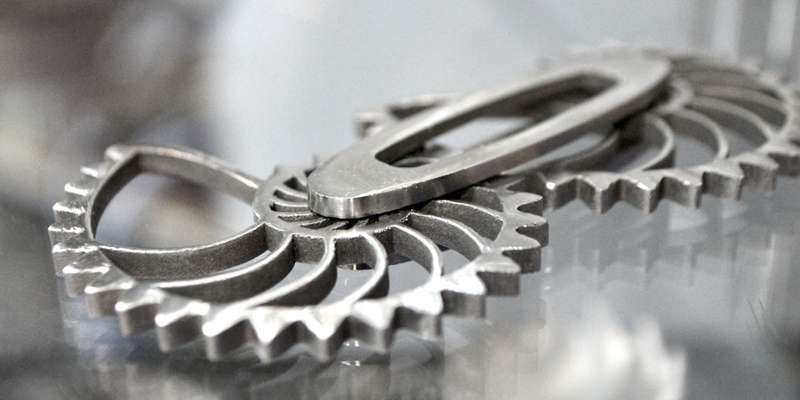- September 30, 2022
Titanium is a metal that is growing in demand. This is because it has excellent corrosion resistance and a wide range of desirable mechanical properties. To take advantage of titanium’s unique qualities, manufacturers add smaller amounts of other elements to pure titanium to modify the metal’s physical properties.
As a result, there are many types of titanium alloys to choose from, as they offer different properties and costs. In this write-up, we discuss the different classifications of titanium alloys and the applications of each of these classifications.
Classification of Titanium Alloys by Structure
The microstructure is a method used to classify titanium alloys. The structure of these types of titanium alloys depends on the alloy composition and process used to make them.
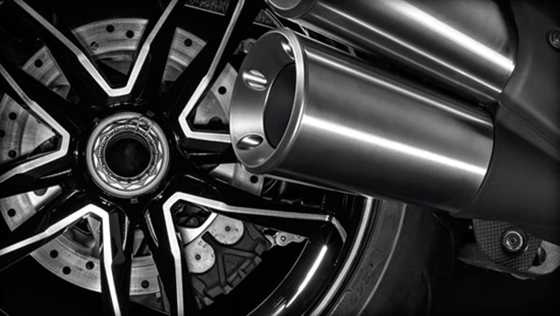
Alpha Alloys
Alpha alloys are titanium alloys that are only purposely alloyed with oxygen. While other components such as carbon and iron can be found in small quantities, they only exist as impurities. As an interstitial alloying element, oxygen significantly boosts strength while decreasing ductility. The chemical and engineering industries are the primary users of alpha alloys.
Here, great corrosion behavior and deformability are more important than high (specific) strength. The main difference between commercially pure (cp) titanium grades is their oxygen concentration.
Near-Alpha Alloys
Near-alpha alloys of titanium are the most common high-temperature alloys. This alloy class is appropriate for high temperatures because it combines the superior creep behavior of alpha alloys with the high strength of alpha + beta alloys. However, their maximum working temperature is now limited to 500 to 550 ºC.
Beta and Near-Beta Alloys
Beta alloys are another type of titanium material. Manufacturers create all titanium alloys by adding enough beta-stabilizing elements to titanium. These materials have been available for many years but have only lately gained popularity. They are more easily cold workable than alpha-beta alloys, heat treatable to high strengths, and some have better corrosion resistance than commercially pure grades.
Alpha and Beta Alloys
These are typically medium to high strength materials with tensile strengths ranging from 620 to 1250 MPa and creep resistance ranging from 350 to 400°C. In addition to tensile properties, they also have low and high cycle fatigue and fracture toughness characteristics.
As a result, people developed thermomechanical and heat treatment procedures to ensure that the alloys provide an optimal balance of mechanical properties for various applications.
Classification of Titanium Alloys by Strength
When designing a part or product, it is important to know the strength characteristics of the material for the design and selection of the product. There are different types of titanium alloys available so it’s important to have an understanding of all of these properties to use them effectively.
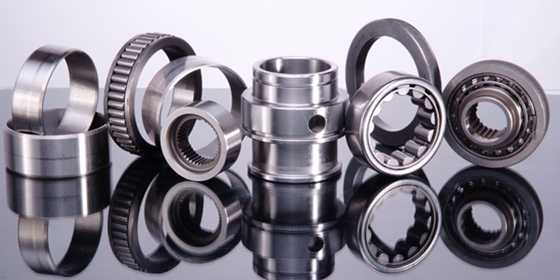
Low Strength
These are alloys of titanium with a yield strength of fewer than 73 KSI (500 MPa). They function in applications that need moderately strong materials. Examples include ASTM grades 1,2,3,7 and 11.
Moderate Strength
These are titanium alloys with yield strength between 73 and 131 KSI (500 and 900 MPa). They ASTM grades 4,5, and 9, Ti-2.5%Cu, Ti-8%Al-1%Mo-0.1%V.
Medium Strength
These are titanium alloys with yield strength between 131-145 KSI (900-1000 MPa). They function in critical applications requiring high-strength properties, good corrosion resistance, and notch toughness at elevated temperatures. Some examples include Ti-6%Al-2%Sn-4%Zr-2%Mo and Ti-5.5%Al-3.5%Sn-3%Zr-1%Nb-0.3%Mo-0.3%Si.
High Strength
High-strength alloys of titanium have tensile strengths between 145 and 174 KSI(1000-1200 MPa). They are resistant to fatigue, creep, and corrosion, making them suitable for demanding applications such as aircraft parts and medical implants.
Very High Strength
Very high-strength alloys have tensile strengths exceeding 174 KSI (1200 MPa). This material class is expensive but offers exceptional performance in demanding applications such as jet engines, rocket motors, spacecraft, and nuclear reactors. Examples include Ti-10%V-2%Fe-3%Al and Ti-4%Al-4%Mo-4%Sn-0.5%Si.
Grades of Titanium Alloys with Properties and Applications
Titanium alloys are available in a wide range of grades, each with its specific properties. The following are some of the most common titanium alloy grades.
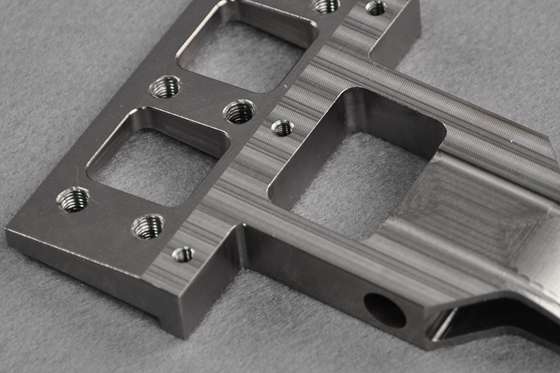
Grade 5 Titanium Alloy
Grade 5 is the most common titanium alloy due to its high strength. It is a commonly welding alloy that can function in structural and pressure-containing components. It has high corrosion resistance in both oxidizing and reducing environments.
In addition, it also finds use in the chemical and petroleum industries and the fabrication of offshore drilling platforms. The alloy functions in constructing water treatment facilities, nuclear reactors, and other critical environments requiring a high-strength, low-cost material.
Grade 6 Titanium Alloy
Grade 6 is a commonly welded titanium alloy containing aluminum and tin often used for components exposed to elevated temperatures. In addition to its high-strength properties, the alloy has excellent stability, making it a good choice for airframes and jet engines.
Grade 7 Titanium Alloy
Grade 7 titanium alloy is especially useful for low temperatures and pH applications. This is a result of its extreme corrosion resistance.
Grade 11 Titanium Alloy
Grade 11 is a titanium alloy with good high-temperature strength and high corrosion resistance. The alloy is a raw material for components operating in high temperatures, such as chemical and petroleum processing equipment and manufacturing aircraft engines and airframes. Grade 11 is also used to manufacture turbines, liquid hydrogen storage tanks, and other critical equipment. The alloy is easily fabricated by machining, forging, rolling, and extruding.
Grade 12 Titanium Alloy
It applies to manufacturing aircraft components, such as engine parts, airframes, landing gear, fuel systems, and other critical equipment. The alloy is also used to manufacture cryogenic vessels, heat exchangers, distillation columns, and other equipment operating at high temperatures.
In addition, grade 12 is easily fabricated by machining, forging, rolling, and extruding. Therefore, it is ideal for the manufacture of valves, fittings, and other equipment requiring corrosion-resistant materials.
Grade 23 Titanium Alloy
Grade 23 is a titanium alloy with good ductility and fracture toughness. It functions mostly in the manufacture of medical implants.
Why is Machining Titanium Alloys Difficult?
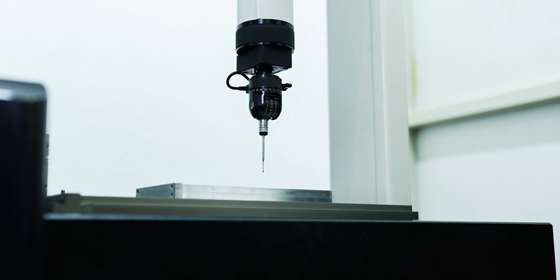
Titanium alloys are difficult to machine because they are hard and have a low coefficient of friction. The hardness of titanium results from its high strength and density, making it difficult to cut and shape. High strength also means that the material is less malleable and prone to cracking, which can happen during machining, heat treatment, or welding.
The low coefficient of friction can cause problems when cutting or milling titanium with conventional tooling materials. Titanium chips easily make it difficult for the tool to remove material from the workpiece. Chips also tend to stick to the tool tooth surface because there is no lubrication between them and the tool. This causes chip build-up on the tool face at high feed rates, resulting in poor surface finishes, reduced tool life, and excessive vibration during machining.
Another difficulty with machining titanium alloys is their low thermal conductivity, which means they don’t cool down quickly enough when machining with cutting fluids or water cooling systems. This causes the workpiece material to become soft and reduces tool life because of chattering or breakage of tools.
Tips on How to Machine Titanium Alloys Effectively
Given the special properties of titanium alloys, machining these metals can be a little tricky. To machine these components effectively, you must know what tools and techniques to use. We have compiled a list of useful tips on how you can machine titanium alloys effectively.
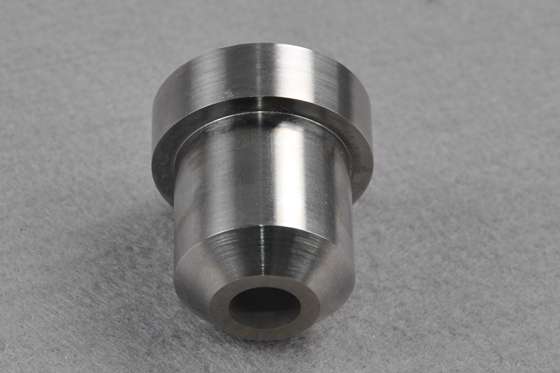
Use the Right Tools and Equipment
First and foremost, you must ensure that you are using the right tools and equipment for the job. This might sound pretty obvious, but it’s a crucial step in any machining process. Titanium alloys are more difficult to machine due to their increased hardness. Always use high-speed steel tools and carbide-tipped bits when cutting titanium. Steel tools will dull quickly when used on this material, while carbide tips cut cleanly and last longer.
Transmit the Generated Heat into the Chip
One important aspect of efficiently machining titanium is transmitting the generated heat into the chip. This helps to keep the workpiece, the tool, and the coolant fluid at a relatively consistent temperature. The most effective way to do this is to use a horizontal spindle machine for titanium machining.
Another thing you can do to transmit the generated heat into the chip is to increase the feed rate for the part. A higher feed rate can help to keep the temperature consistent during the machining process. This can be especially helpful when machining parts with large feature sizes.
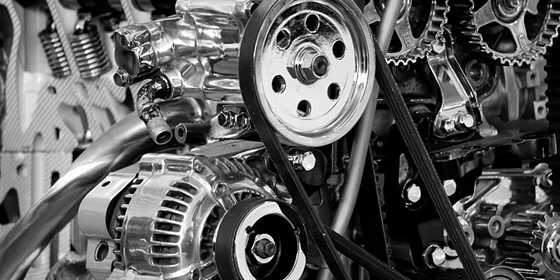
Increase Coolant Concentration and Pressure
As mentioned, titanium alloys have a higher heat conductivity than other metals. Therefore, you should increase the coolant concentration and pressure when machining these materials. Increasing the coolant concentration can help reduce the heat that builds up in the machine. It can also help to keep the workpiece and tool at a relatively consistent temperature, allowing you to increase feed rates for the part.
If you are using a water-based coolant, you can increase the concentration of this fluid by adding an antifoaming agent. A good option for an antifoaming agent is sodium salts, which help increase water’s boiling point and viscosity.
Avoid Galling
Titanium alloys typically have a lower lubricity than other metals. This means that they are more likely to gall during machining. Galling is a phenomenon that occurs when two opposing pieces of metal come into contact, and one piece becomes trapped between the two. Galling can cause the machining process to become much more difficult and significantly reduce tool life.
You can help to avoid galling when machining titanium alloys by using a smaller feed rate and a lower spindle speed. In addition, if you are already experiencing galling, you can often fix the problem by increasing the coolant concentration. This can help break the existing gall and allow you to continue the machining process.
Applications of Titanium Alloys
Aerospace Industry

Titanium alloys are used extensively in the aerospace industry due to their high strength-to-weight ratio. They are used to make aerospace fasteners, aircraft frames, landing gear assemblies, and jet engines because they can withstand extreme temperatures without corroding or cracking under pressure.
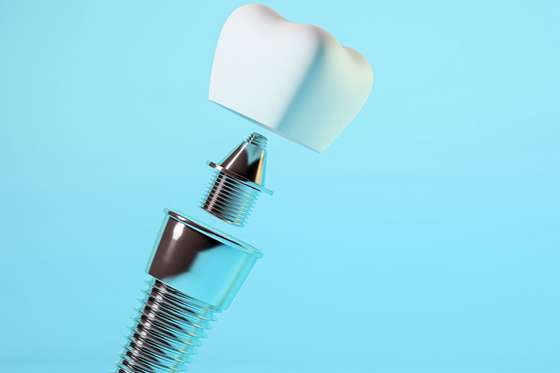
Medical Industry
Titanium alloys are used in medical devices such as artificial joints and hip replacements because they are biocompatible and corrosion-resistant. The metal can be machined into intricate shapes without fracturing or cracking, making it ideal for surgical instruments such as scalpels or forceps. It is also used in dental implants because it does not irritate soft tissues like stainless steel does when implanted into the mouth cavity.
Electronic Industry
Titanium alloys have many uses in electronics because they are highly conductive and resistant to corrosion from most acids and alkalis. This makes them ideal for use as connectors in batteries or other electrical components that require electrical contact with each other but must not corrode over time from exposure to corrosive substances such as salt water.
Conclusion
So, which titanium alloys have the best properties for your application? It’s hard to say. It depends on your requirements and what you need the alloy for. For instance, if you’re creating some sort of eyewear, it would be better to use purer titanium because that particular application wouldn’t need the strength of an alloy.
But we could take this discussion in a million different directions, so you can consult an expert to determine which type of titanium alloy is best for your project.
WayKen Helps To Choose the Right Titanium Alloys for Your Projects
As an ISO-certified machine shop, our experienced engineers will recommend the most suitable titanium material for your specific application. Through our precision machining services, you can be sure to get a high standard of titanium parts at WayKen. In addition, we offer 100% part inspection so that every part produced meets the requirements.
Just upload CAD files today and you’ll get a quick quote and free DFM feedback!

